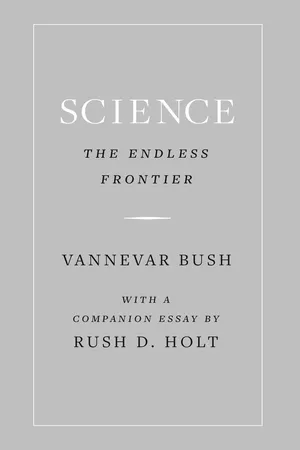
- English
- ePUB (mobile friendly)
- Available on iOS & Android
Science, the Endless Frontier
About this book
The classic case for why government must support science—with a new essay by physicist and former congressman Rush Holt on what democracy needs from science today
Science, the Endless Frontier is recognized as the landmark argument for the essential role of science in society and government's responsibility to support scientific endeavors. First issued when Vannevar Bush was the director of the US Office of Scientific Research and Development during the Second World War, this classic remains vital in making the case that scientific progress is necessary to a nation's health, security, and prosperity. Bush's vision set the course for US science policy for more than half a century, building the world's most productive scientific enterprise. Today, amid a changing funding landscape and challenges to science's very credibility, Science, the Endless Frontier resonates as a powerful reminder that scientific progress and public well-being alike depend on the successful symbiosis between science and government.
This timely new edition presents this iconic text alongside a new companion essay from scientist and former congressman Rush Holt, who offers a brief introduction and consideration of what society needs most from science now. Reflecting on the report's legacy and relevance along with its limitations, Holt contends that the public's ability to cope with today's issues—such as public health, the changing climate and environment, and challenging technologies in modern society—requires a more capacious understanding of what science can contribute. Holt considers how scientists should think of their obligation to society and what the public should demand from science, and he calls for a renewed understanding of science's value for democracy and society at large.
A touchstone for concerned citizens, scientists, and policymakers, Science, the Endless Frontier endures as a passionate articulation of the power and potential of science.
Tools to learn more effectively

Saving Books

Keyword Search

Annotating Text

Listen to it instead
Information
Science, the Endless Frontier
President Roosevelt’s Letter
THE WHITE HOUSE
DEAR DR. BUSH:
Letter of Transmittal
OFFICE OF SCIENTIFIC RESEARCH AND DEVELOPMENT
DEAR MR. PRESIDENT:
1
Introduction
Scientific Progress Is Essential
Science Is a Proper Concern of Government
Table of contents
- Cover Page
- Advance Praise for Science, the Endless Frontier
- Title Page
- Copyright Page
- Contents
- The Science Bargain
- Science, the Endless Frontier
- Acknowledgments
- Notes
Frequently asked questions
- Essential is ideal for learners and professionals who enjoy exploring a wide range of subjects. Access the Essential Library with 800,000+ trusted titles and best-sellers across business, personal growth, and the humanities. Includes unlimited reading time and Standard Read Aloud voice.
- Complete: Perfect for advanced learners and researchers needing full, unrestricted access. Unlock 1.4M+ books across hundreds of subjects, including academic and specialized titles. The Complete Plan also includes advanced features like Premium Read Aloud and Research Assistant.
Please note we cannot support devices running on iOS 13 and Android 7 or earlier. Learn more about using the app